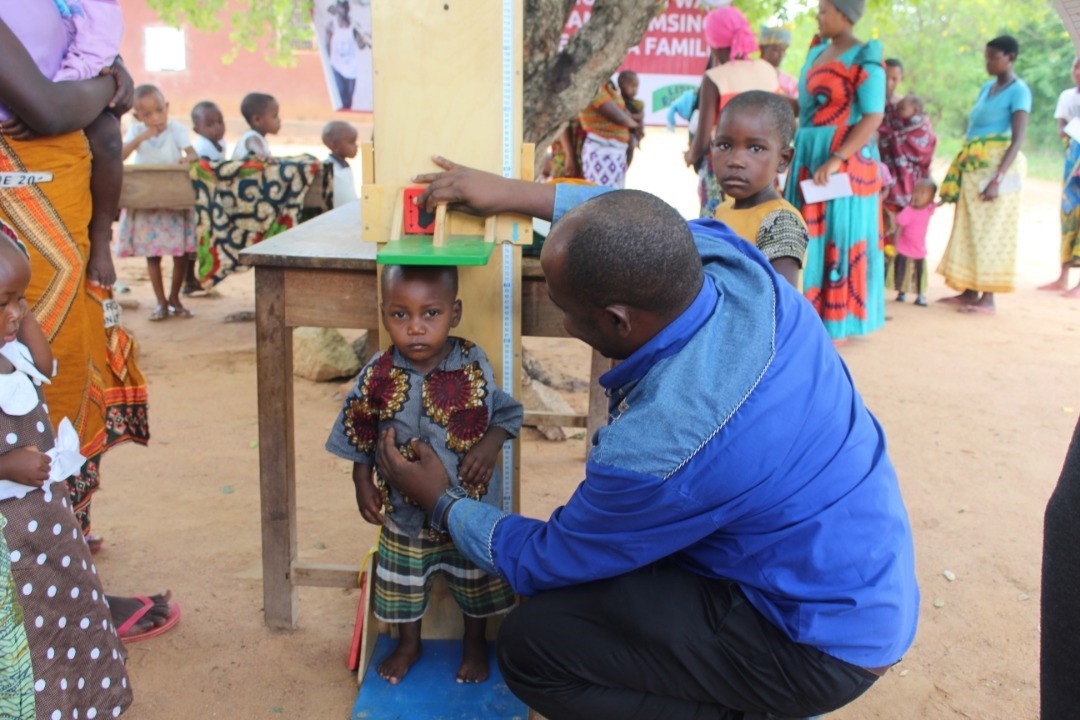Nutrition during the first 1000 Days
News
26 October 2020
A CHW at Jangalo village, taking height measurements of a child during Village Health and Nutrition Days in Chemba DC under Lishe Kijinsia (Lishe Dodoma) project funded by the Irish Aid
The Centre for Counselling, Nutrition and Health Care (COUNSENUTH) is a non-governmental, non-profit organization established in Tanzania in 1998, which focuses on provision of nutrition services. COUNSENUTH’s mission is to improve the quality of life of vulnerable groups through evidence-based and locally appropriate actions. They also advocate for better governance around nutrition, actively engaging citizens at all levels.
Ireland supports COUNSENUTH for the implementation of Lishe Dodoma, a community-based nutrition programme, which integrates nutrition education and counselling on maternal, infant and young child feeding and at health facility and community levels in Chemba district. The programme supports capacity building among Local Government Authorities to enable effective planning and budgeting for prioritised nutrition interventions at the district level - focusing on the first 1,000 days of life.
Nutrition interventions implemented by COUNSENUTH are centred around addressing gender disparities in communities through the Transformative Reflective Leadership Approach (TRLA), which takes village leaders through a process of reflection on what the local obstacles affecting the health of women and children are.
Chemba District has high levels of malnutrition, with a prevalence of stunting among children under five of 41% (national average 32%). The programme aims to reduce this condition by at least 5% in Chemba District and to contribute to evidence-based learning in this area.
This Ireland’s third grant to COUNSENUTH to support the implementation of the Lishe Dodoma programme. To date, the programme has achieved 75% coverage of villages and key beneficiaries, providing them with key nutrition messaging through Village Health and Nutrition Days (VHNDs). Working in collaboration with formal Community Health Workers (CHW), the programme has succeeded in reaching and registering 51% and 55% of pregnant women and children under five respectively in the catchment areas. This has further allowed them to identify the most vulnerable.
COVID-19 and Water Availabiity
Multiple cases of COVID-19 were reported in Dodoma between March-May, threatening an already stressed healthcare system. As the district is extremely water-stressed, the lack of reliable portable water further hinders communities’ ability to practice proper handwashing, putting them at risk of WASH-related (Water, Sanitation and Hygiene) illnesses, as well as COVID-19. Additionally, poor nutrition affects immune function, making malnourished individuals more susceptible to other diseases, including COVID-19.
This year, therefore, COUNSENUTH will be working to strengthen nutrition services while supporting the district to respond to and mitigate the impacts of COVID-19. Their approach is to strengthen community-based interventions to decongest health facilities, targeting the most vulnerable households (including those with children under five and pregnant and lactating women).
COUNSENUTH will develop messaging on nutrition, WASH practices, the increased risk of Gender Based Violence due to COVID-19, and COVID-19 prevention measures, which will be broadcast through local radios. They will construct an additional 6 wells (making a cumulative total of 9 wells) and procure 25 water tanks for water harvesting and storage.
The Centre will facilitate the distribution of 245 hand washing facilities and liquid soap in critical places such as health facilities, village and ward offices, schools, and places of worship. They will also distribute 19,000 locally made cloth masks.
The expansion of WASH services in the district is a key priority for Ireland, as access to clean, safe water has been proven to improve nutrition, and reduce the workload for women and girls, who often have to walk long distances to find clean water for the family. Furthermore, the wells and water harvesting are key to local adaptation to Climate Change, in an area vulnerable to climate impacts.
Community Health Volunteers will be supported and equipped with personal protective equipment to continue providing community-based services including nutrition education, child growth monitoring and promotion, and cooking demonstrations using locally available foods.
To limit potential transmissions, these activities will be conducted in small groups, rather than at village level. They will work with CHWs and health care providers to ensure that other vital components of traditional VHNDs, such as immunization, provision of supplements, nutritional assessments and other essential services to pregnant women and children under five years continue in the community.


